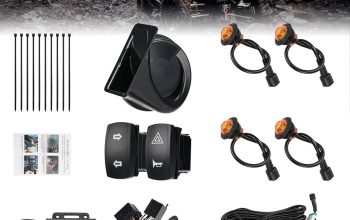To charge the battery on a John Deere Gator, connect the charger to the battery terminals. Ensure the charger is set to the appropriate voltage.
John Deere Gators are reliable utility vehicles used for various tasks on farms, ranches, and large properties. Proper battery maintenance ensures the Gator operates efficiently. Charging the battery is a straightforward process that requires minimal tools. Always use a charger compatible with the Gator’s battery specifications.
Regularly check the battery for corrosion and clean the terminals. This not only extends the battery life but also enhances the vehicle’s performance. Keeping the battery charged and well-maintained prevents unexpected breakdowns. Follow these steps to ensure your John Deere Gator remains ready for use whenever needed.
Preparation
Before charging your John Deere Gator battery, preparation is crucial. Proper steps ensure safety and efficiency. Let’s dive into the necessary preparations.
Gather Necessary Tools
First, gather all essential tools for the job. You will need the following:
- Battery charger
- Protective gloves
- Safety goggles
- Wrench set
- Clean cloth
Having these tools ready will make the process smoother.
Ensure Safety Precautions
Safety is the top priority. Follow these safety steps:
- Wear protective gloves and safety goggles.
- Ensure the Gator is parked on a flat surface.
- Turn off the engine and remove the key.
- Disconnect the negative terminal before the positive.
These precautions help prevent accidents and injuries.
Locate The Battery
Charging the battery on your John Deere Gator starts with finding it. Knowing the right steps ensures safety and efficiency. Follow this guide to locate the battery with ease.
Open The Hood
The first step is to open the hood of your John Deere Gator. Look for the hood latch near the front of the vehicle. Release the latch by pulling it. Lift the hood carefully to avoid any damage.
Ensure the hood stays open by securing it with the hood prop. This gives you a clear view of the engine compartment.
Identify Battery Position
Now, you need to identify the battery position. The battery is usually located near the engine. Look for a rectangular box with two cables attached to it.
The battery has a positive (red) and a negative (black) terminal. Ensure you locate these terminals correctly. This is crucial for charging the battery safely.
| Step | Description |
|---|---|
| Open the Hood | Release the hood latch and lift the hood |
| Secure the Hood | Use the hood prop to keep it open |
| Locate the Battery | Find the rectangular box with two cables |
Following these steps will help you locate the battery easily. This ensures you can proceed to charge it without any issues.
Disconnect The Battery
Disconnecting the battery on your John Deere Gator is crucial. It ensures safety during the charging process. Follow these steps carefully to avoid any mishaps.
Remove Negative Terminal
First, locate the negative terminal on the battery. It usually has a black cable. Use a wrench to loosen the bolt on the negative terminal. Once loose, carefully lift the cable off the terminal. Keep the cable away from the battery to prevent accidental contact.
Remove Positive Terminal
Now, locate the positive terminal. This terminal typically has a red cable. Use a wrench to loosen the bolt on the positive terminal. Carefully lift the cable off the terminal once the bolt is loose. Keep the positive cable away from any metal parts.
Inspect The Battery
Inspecting the battery of your John Deere Gator ensures it functions well. A quick inspection can save you from unexpected battery issues. Let’s dive into the steps to inspect the battery.
Check For Corrosion
Corrosion can affect battery performance. Look at the battery terminals. Ensure there are no white or blue deposits. Use a wire brush to clean any corrosion. Wear gloves to protect your hands. A clean battery ensures a good connection.
Assess Battery Condition
After checking for corrosion, assess the battery’s overall condition. Look for any cracks or leaks. A damaged battery can be dangerous. Replace it if you see any damage.
Check the battery voltage with a multimeter. A fully charged battery should read around 12.6 volts. If the voltage is lower, recharge the battery. If the battery does not hold a charge, consider replacing it.
| Condition | Action |
|---|---|
| No Corrosion | Battery is in good condition |
| Minor Corrosion | Clean with a wire brush |
| Significant Corrosion | Replace the battery |
| Voltage above 12.6V | Battery is fully charged |
| Voltage below 12.6V | Recharge or replace the battery |
Set Up The Charger
Charging the battery on your John Deere Gator is crucial for maintaining its performance. Proper setup of the charger ensures a safe and efficient charging process. Follow these steps to set up the charger correctly.
Choose Correct Charger
Selecting the right charger for your John Deere Gator is essential. Ensure the charger matches the battery’s voltage and type. A mismatch can damage the battery or charger.
| Battery Type | Recommended Charger |
|---|---|
| Lead-Acid | 12V Lead-Acid Charger |
| Lithium-Ion | 12V Lithium-Ion Charger |
Connect Charger To Battery
Follow these steps to connect the charger to the battery:
- Turn off the Gator.
- Locate the battery compartment.
- Identify the battery terminals.
- Connect the red cable to the positive terminal (+).
- Connect the black cable to the negative terminal (-).
- Ensure all connections are secure.
Make sure the charger is in a well-ventilated area. Avoid placing it near flammable materials.
Plug the charger into a power outlet. Turn on the charger, and monitor the charging process.
Charging The Battery
Keeping the battery of your John Deere Gator charged is essential. A well-charged battery ensures your vehicle runs smoothly. Follow these steps to charge the battery efficiently.
Select Charging Mode
First, connect the charger to your Gator’s battery. Ensure the charger is plugged into a power source. Most chargers have different modes. Select the correct charging mode for your battery type. Usually, there are options like fast charge or trickle charge.
Refer to the charger manual to choose the right mode. For a quick charge, use the fast charge mode. For longer battery life, use the trickle charge mode. Make sure the connections are tight and secure.
Monitor Charging Progress
Once the charger is connected, monitor the charging progress. Many chargers have indicators to show charging status. Look for lights or digital displays. These will tell you if the battery is charging or fully charged.
Check the battery’s temperature during charging. It should not get too hot. If it does, disconnect the charger immediately. Let the battery cool before trying again. This helps prevent damage and ensures safety.
| Mode | Usage |
|---|---|
| Fast Charge | Quick battery charging |
| Trickle Charge | Extends battery life |
Follow these steps to ensure your John Deere Gator is always ready for action. Proper charging habits can prolong the life of your battery. Keep an eye on the indicators and ensure everything is working as expected.
Reconnecting The Battery
After successfully charging your John Deere Gator’s battery, the next step is to reconnect it. This process involves attaching the terminals correctly. Follow these steps to ensure a safe and secure connection.
Attach Positive Terminal
Start by connecting the positive terminal. This terminal is usually marked with a plus sign (+). Ensure the connection is tight and secure. Use a wrench to fasten the terminal if needed.
- Identify the positive terminal
- Align the terminal with the battery post
- Secure with a wrench
Attach Negative Terminal
Next, move on to the negative terminal. This terminal is marked with a minus sign (-). Ensure the connection is equally tight and secure. Use the wrench again for a firm connection.
- Identify the negative terminal
- Align the terminal with the battery post
- Secure with a wrench
Here is a quick comparison of both terminals:
| Terminal Type | Symbol | Tool Needed |
|---|---|---|
| Positive Terminal | + | Wrench |
| Negative Terminal | – | Wrench |
Ensuring correct connection of both terminals is crucial. It ensures your John Deere Gator runs smoothly. Take your time and double-check each connection.
Final Checks
After charging your John Deere Gator battery, performing final checks is crucial. These steps ensure the battery functions correctly and your Gator operates smoothly.
Test Battery Performance
Start by testing the battery’s performance. Use a multimeter to measure the voltage. Ensure the reading is between 12.6 to 12.8 volts for a fully charged battery.
- Turn off all electrical components before testing.
- Connect the multimeter’s positive lead to the battery’s positive terminal.
- Connect the negative lead to the battery’s negative terminal.
If the voltage is within the correct range, your battery is in good shape. If not, recheck the charging process and inspect for any issues.
Close The Hood
Next, carefully close the hood of your John Deere Gator. Ensure all tools and equipment are removed from the battery area. Gently lower the hood and secure it in place. Make sure the hood is properly latched to avoid any safety hazards.
These final checks confirm your Gator is ready for use. A well-maintained battery ensures optimal performance and longevity of your vehicle.
Frequently Asked Questions
Where Is The Battery Located On A John Deere Gator?
The battery on a John Deere Gator is under the passenger seat. Lift the seat to access the battery.
How Long Does It Take To Charge A John Deere Gator Battery?
Charging a John Deere Gator battery typically takes 8 to 12 hours. Use the recommended charger for best results. Ensure the battery is fully charged before use.
Are John Deere Batteries Rechargeable?
Yes, John Deere offers rechargeable batteries. These batteries are designed for various equipment and provide reliable power.
Do John Deere Gators Have Alternators?
Yes, John Deere Gators have alternators. These alternators help charge the battery and power electrical components.
Conclusion
Charging your John Deere Gator battery is simple with these steps. Regular maintenance ensures longer battery life. Always follow safety guidelines and manufacturer instructions. Proper charging keeps your Gator running smoothly. Remember to check the battery periodically. This helps avoid unexpected issues and prolongs the vehicle’s lifespan.
Happy driving!


